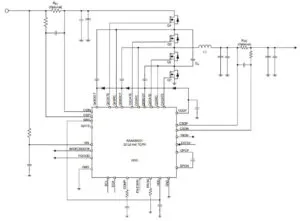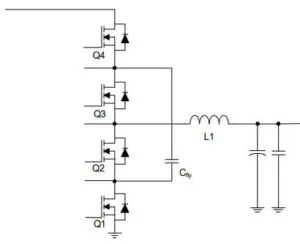“The three-level converter delivers exceptional efficiency and significantly reduces the required inductance for regulating the output voltage,” according to the company.
Compared to a standard (two-level) buck converter, a three-level buck adds two additional switches and a flying capacitor (see diagram).
“The flying capacitor reduces voltage stress on the switches, allowing designers to use lower voltage FETs with better figures of merit – the result is reduced conduction and switching losses,” said Renesas. “The inductor sees “peak-to-peak ripple of only about 25% of that of a two-level converter, enabling reduced inductor core and direct current resistance losses”.
There are two control ICs:
- RAA489300
Input: 4.5 to 57.6V
Output 3 to 54.912V
Switching up to 400kHz
(800kHz and switch node) - RAA489301
Input: 4.5 to 24V
Output: 3V to 24V
Switching up to 367kHz
(734kHz at switch node)
 “RAA489300 is an ideal choice for applications requiring versatile input sources, such as high-power
“RAA489300 is an ideal choice for applications requiring versatile input sources, such as high-power
barrel adapters and USB Power Delivery (USB PD) adapters. For USB PD, it complies with PD specifications and supports PPC [programmable power supply] and AVS [adjustable voltage supply],” said Renesas. RAA489301 supports input sources such as batteries of various chemistries in 2S to 5S configurations, and it supports the USB PD adapter safely converting it to a voltage up to 24V.”
Independent control loops are included for input voltage, input current, output voltage and output current, and transitions across the Vout=Vin/2 boundary are described as “seemless”.
Both devices offer a pass-through mode to cut power loss when Vout =Vin, and a separate output, backed by its own charge pump, is available to isolate either the input or the output using an external n-channel series mosfet, or a back-to-back pair for bi-directional blocking.
Control for many parameters is over a serial SMBus/I2C bus and protections include over-current, over-voltage, under-voltage and over-temperature.
When remotely shut-down. power consumption can be as low as 25µA, and the devices can soft-start into a pre-biassed load.
Packaging is 4 x 4mm 32pad TQFN.
Development tools include the RTK-251-SinkCharger-240W Kit and the RTKA489300DE0000BU evaluation board.
Applications are expected in PD chargers, PC docking stations, robots and drones.
Find the RAA489300 at this Renesas web page.

